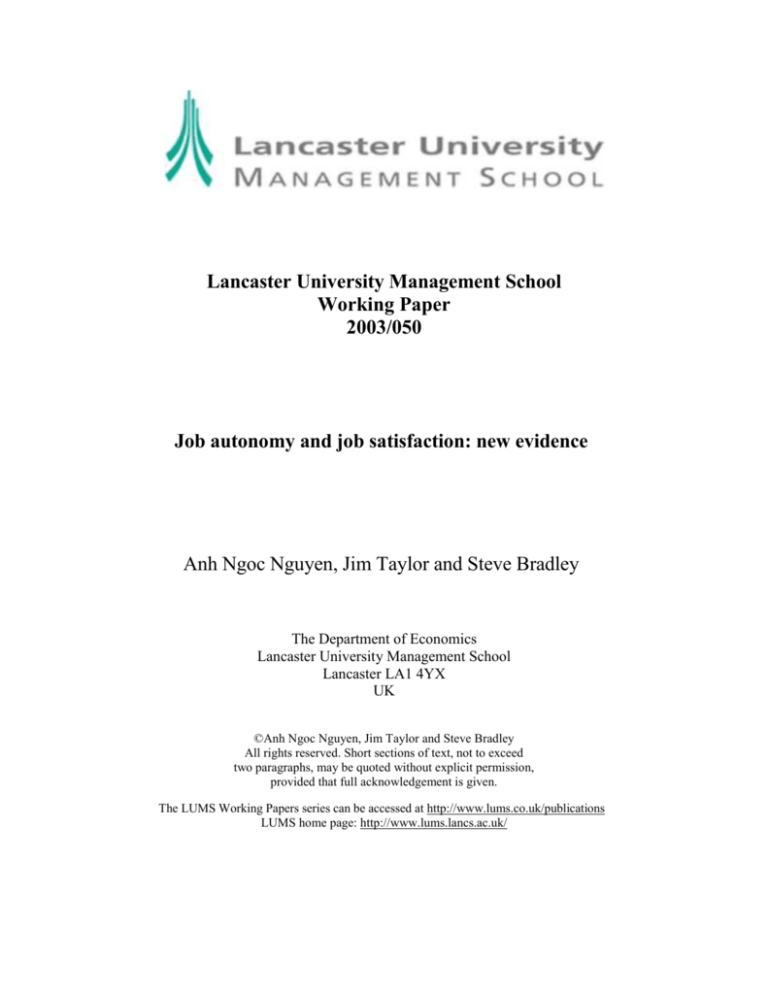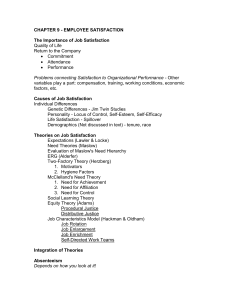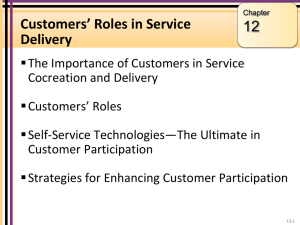
Lancaster University Management School
Working Paper
2003/050
Job autonomy and job satisfaction: new evidence
Anh Ngoc Nguyen, Jim Taylor and Steve Bradley
The Department of Economics
Lancaster University Management School
Lancaster LA1 4YX
UK
©Anh Ngoc Nguyen, Jim Taylor and Steve Bradley
All rights reserved. Short sections of text, not to exceed
two paragraphs, may be quoted without explicit permission,
provided that full acknowledgement is given.
The LUMS Working Papers series can be accessed at http://www.lums.co.uk/publications
LUMS home page: http://www.lums.lancs.ac.uk/
Job autonomy and job satisfaction: new evidence
Anh Ngoc Nguyen, Jim Taylor and Steve Bradley*
Department of Economics
Management School
Lancaster University
Lancaster, England
a.nguyen@lancaster.ac.uk
jim.taylor@lancaster.acuk
s.bradley@lancaster.ac.uk
August 2003
Abstract: This paper investigates the impact of perceived job autonomy on job satisfaction.
We use the fifth sweep of the National Educational Longitudinal Study (1988-2000), which
contains personally reported job satisfaction data for a sample of individuals eight years after
the end of compulsory education. After controlling for a wide range of personal and jobrelated variables, perceived job autonomy is found to be a highly significant determinant of
five separate domains of job satisfaction (pay, fringe benefits, promotion prospects, job
security and importance / challenge of work).
Job, autonomy, satisfaction, pay, gender, promotion
JEL classification: I31, J28
* Anh Nguyen would like to thank the ESRC for financial support under its Post-doctoral Fellowship
Programme. Communications to be addressed to Professor Jim Taylor, Management School,
Department of Economics, Lancaster University, Lancaster, LA1 4YX, England.
1
References
Akerlof. G., Rose, A., Yellen, J., 1988. Job Switching and Job Satisfaction in the U.S. Labor
Market, Brookings Papers on Economic Activity 2, 495-582. Allen, J., van der Velden,
R., 2001. Educational mismatches versus skill mismatches: Effects
on wages, job satisfaction and on-the-job search, Oxford Economic Papers 53, 434-452.
Anderson, L., Tolson, J., Filed, M., Thacker, J., 1992. Job autonomy as a moderator of the
Pelz effect, Journal of Social Psychology 130, 707-708. Argyle, M., 1989. The Social
Psychology of Work, 2nd edition. Harmondsworth: Penguin. Belfield, C., Harris, R., 2002.
How well do theories of job matching explain variation in job
satisfaction across educational level? Evidence for UK graduates, Applied Economics
34, 535-0548. Bhuian, S., Al-Shammari, E., Jefri, O., 1996. Organizational
commitment, job satisfaction
and job characteristics: An empirical study of expatriates in Saudi Arabia, International
Journal of Commerce & Management 6, 57-80. Birdseys, M., Hill, J., 1995. Individual,
organizational/work and environmental influence on
expatriate turnover tendencies: An empirical study, Journal of International Business,
Fourth Quarter, 787-813. Blanchflower, D.,,Oswald, A., 2000. The rising well-being of
the young, in Youth
Employment and Joblessness in Advanced Countries, edited by D. Blanchflower and R.
Freeman. Chicago: The University of Chicago Press. Blanchflower, D., Oswald, A.,
1999. Well-being, insecurity and the decline of American job
satisfaction, mimeo, Dartmouth College, USA. Borjas, G., 1979. Job satisfaction,
wages and union, Human Resources XIV, 21-40. Booth, A., Francesconi, M., Frank, J., 2002.
Temporary jobs: Stepping stones or dead ends?
Economic Journal 112, F189-F213. Clark, A. E., 1997. Job satisfaction and gender:
Why are women so happy at work? Labour
Economics 4, 341-372. Clark A. E., 1999. Are wages habit-forming? Evidence from
micro data, Journal of Economic
Behavior and Organization 39, 179-200. Clark, A. E., 2001. What really matters in a
job? Hedonic measurement using quit data,
Labour Economics 8, 223-242. Clark A. E., Oswald, A. J., 1994. Unhappiness and
unemployment, Economic Journal 104,
May, 648-659.
13
Clark A. E., Oswald A. J., 1996. Satisfaction and comparison income, Journal of Public
Economics 61, 359-381. Clark, A., Oswald, A., Warr, P., 1996. Is job satisfaction Ushaped in age? Journal of
Occupational and Organizational Psychology 69, 57-81. Clark, A., Geogellis, Y.,
Sanfey P., 1997. Job satisfaction, wage changes and quits: Evidence
from Germany, mimeo, University of Orleans. Easterlin, R. A., 2001. Income and
happiness: Towards a unified theory, Economic Journal
111, July, 465-484. Freeman, R. N., 1978. Job satisfaction as an economic variable,
American Economic Review
68, 2, 135-141. Frey, B., Stutzer A., 2002a. Happiness and Economics. Princeton and
Oxford: Oxford
University Press. Frey, B., Stutzer A., 2002b. What can economists learn from
happiness research? Journal of
Economic Literature, forthcoming. Galdeano, A., 2001. Gender differences in job
satisfaction and labour market participation:
UK evidence from propensity score, mimeo, European University Institute, Florence.
Groot, W., van den Brink, H., 1999. Job satisfaction and preference drift, Economic Letters
63, 363-367. Hamermesh, D., 1977. Economic aspects of job satisfaction, in Essays in
Labor Market
Analysis, edited by Ashenfelter O and Oates W, Toronto: John Wiley&Son.
Hamermesh, D., 1999. Changing inequality in markets for work place amenities. Quarterly
Journal of Economics CXIV, 1085-1123. Hamermesh, D., 2001. The changing
distribution of job satisfaction, Human Resources 36
(1), 1-30. Iaffaldano, M. T., Muchinski, P. M., 1985. Job satisfaction and job performance: a
meta-analysis, Psychological Bulletin 97 (2), 251-273. Iverson, R., 2000. An event history
analysis of employee turnover: The case of Hospital
employees in Australia, Human Research Management Review 9, 397-418.
Landerweerd, J., Bousmans, N., 1994. The effect of work dimensions and need for autonomy
on nurses’ work satisfaction and health, Journal of Occupational and Organizational
Psychology 67, 207-217. Layard, R., 2003. Happiness – Has social science a clue?
Centre for Economic Performance,
Lionel Robbins Memorial Lectures 2002/3, London School of Economics.
14
Levy-Garboua, L., Montmarquette, C., 1997. Reported job satisfaction: What does it mean?,
Cirano: Canada. Levy-Garboua, L., Montmarquette, C., Simonnet. V., 2001. Job
satisfaction and quits: Theory
and evidence from the German socioeconomic panel, Cirano, Canada. Lydon, R.,
Chevalier, A., 2002. Estimates of the effect of wages on job satisfaction, Centre
for Economic Performance, LSE. McBride, M., 2001. Relative-income effects on
subjective well-being in the cross-section,
Journal of Economic Behavior and Organization 45, 251-278. Moguerou, P., 2002. Job
satisfaction among US Ph.D. graduates: the effects of gender and
employment sector, mimeo, Universite de Bourgogne. Neumark, D., Postlewaite, A.,
1995. Relative income concerns and the rise in married
women’s employment, mimeo, Journal of Public Economics 70, 157-183. Phelps, C.,
2001. A clue to the paradox of happiness, Journal of Economic Behavior &
Organization 45, 293-300. Schienman, S., (2002), Socio-economic status, job
conditions, and well-being: Self-concept
explanations for gender-contingent effects, The Sociological Quarterly 43, 627-646.
Shields, M., Price, S., 2002. Racial harassment, job satisfaction and intentions to quit:
Evidence from the British nursing profession, Economica 69, 295-362. Sloane, P.,
Ward, M., 2001. Cohort effects and job satisfaction of academics, Applied
Economics Letters 8, 787-791. Sloane, P., William, H., 2000. Job satisfaction,
comparison earnings and gender, Labour 14,
473-501. Sousa-Poza, A., Sousa-Poza, A., 2000. Well-being at work: a cross-national
analysis of the
levels and determinants of job satisfaction, Journal of Socio-economics 29, 517-538.
Stutzer, A., 2002. The role of income aspirations in individual happiness, mimeo, School of
Law, University of California at Berkeley. Tsang, M. C., Rumberger, R. W., Levin, M.,
1991. The impact of surplus schooling on
worker productivity, Industrial Relations, 209-228. van Praag, B.M.S., Frijter, P., FerrerCarbonell, A., 2003. The anatomy of subjective well-being, Journal of Economic Behavior
and Organization, forthcoming 51, 29-49. Ward, M., Sloane, P., 1999. Job satisfaction within
the Scottish academic profession,
Discussion Paper No. 39, Institute for the Study of Labour (IZA), Bonn.
15
Weaver, C., 1977. Relationship among pay, race, sex, occupational prestige, supervison,
work autonomy and job satisfaction in a national sample, Personnel Psychology 30,
437-445.






